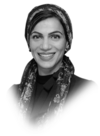Visionary global leadership in AI technology

https://arab.news/5p88p
“Technology is best when it brings people together.” This sentiment, expressed by American entrepreneur and web developer Matt Mullenweg, captures Saudi Arabia’s dynamic approach to artificial intelligence and innovation perfectly.
As I reflect on the Kingdom’s remarkable journey, I am inspired by its unwavering commitment to technological advancement and ensuring innovation serves humanity.
Saudi Arabia is not merely catching up with the future; it is leading the way, crafting a paradigm where technology, ethics and human well-being coalesce into a singular, transformative vision.
In the wake of National Day, Saudi Arabia stands as a beacon of excellence, demonstrating what it means to integrate AI responsibly and ethically, driving forward with a purpose that goes beyond mere technological prowess.
Through Vision 2030, the Kingdom is proving that technology can be harnessed not just to fuel economic growth but enrich lives, promote sustainability, and create a more connected and prosperous society.
Saudi Arabia’s AI journey is built on a foundation of responsibility and ethical governance. It is not just about being technologically advanced; it is about ensuring that technology serves the betterment of humanity.
The Saudi Data and Artificial Intelligence Authority has spearheaded initiatives that ensure AI development is aligned with principles of fairness, transparency and accountability. This strategic alignment ensures that AI is not just a tool of progress, but a force for good.
Under the framework of Vision 2030, Saudi Arabia has embedded AI into critical sectors, including healthcare, education and urban development, with a clear focus on human welfare.
AI is being used to transform the healthcare landscape, providing personalized medicine, enabling earlier diagnoses, and improving patient care in ways that were previously unimaginable. These advancements are fostering a healthier and more resilient population.
The Kingdom’s bold giga-projects are redefining what the future looks like, combining AI with sustainability to create smart, sustainable cities. More than just large-scale infrastructure, they represent Saudi Arabia’s vision of how technology can be seamlessly woven into the fabric of everyday life.
Saudi Arabia has embedded AI into critical sectors, including healthcare, education and urban development, with a clear focus on human welfare.
Dr. Maliha Hashmi
From AI-powered energy grids to smart transportation systems, these projects are leading the charge toward a future that prioritizes environmental stewardship and human well-being.
By harnessing AI for resource management, these projects are reducing carbon footprints, optimizing energy use and ensuring future generations can enjoy a world that is both technologically advanced and environmentally sustainable.
Saudi Arabia’s rise to prominence in the AI world is not by chance — it is the result of a well-thought-out strategy that places ethics at the heart of technological progress.
The Kingdom has quickly emerged as a global leader in AI, ranking among the top countries in the world for AI readiness and digital services. This rise is a testament to Saudi Arabia’s ability to merge technological advancement with ethical governance.
Collaborating with top global leaders in AI, Saudi Arabia has fostered an ecosystem of innovation that is built on strong ethical foundations. The Kingdom’s AI framework ensures the technology used is aligned with the highest global standards, promoting transparency, privacy and fairness.
This commitment to responsible AI development ensures that Saudi Arabia remains at the forefront of global technological leadership while maintaining its dedication to human welfare.
Looking ahead, Saudi Arabia is set to become not only a global leader in AI but also a pioneer in futurism across all sectors. From healthcare to urban planning, the Kingdom’s investments in technology and innovation reflect a deep commitment to creating a sustainable, human-centric future.
Saudi Arabia’s commitment to education, talent development, and infrastructure is building a society that is not just technologically advanced but also equipped to lead in every aspect of futurism.
The nation’s rapid advancements in AI and sustainability are not just for its own benefit — they are a message to the world that technology, when guided by ethics and human-centered values, can create a brighter future for all.
Alhamdulillah, the Kingdom’s journey is just beginning, and its future, powered by AI and shaped by ethical principles, promises to be a source of inspiration for generations to come.
• Dr. Maliha Hashmi is a global health leader, winner of the Forbes Health Leadership Award 2022, recipient of the World Leaders Award, one of the Top Seven Most Talented Female Health Leaders of the MENA region, a C-level healthcare executive, a WEF Global Future Council Expert, and a V2O Delegate of the G20.






























